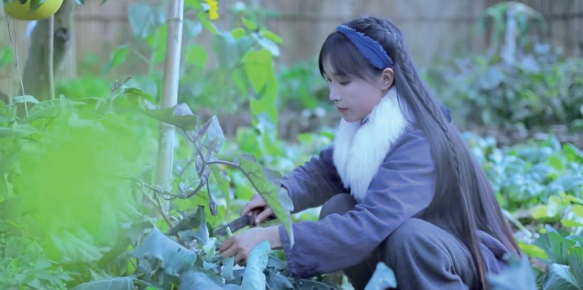中国美食博主如何直播带货 Talk like a Chinese food vlogger
The World of Chinese 2024-01-23 17:40


Want to get paid for eating good food? Here's what you need to know about China's food blogging industry
Chinese netizens were beyond excited when vlogger Li Ziqi (李子柒, lǐ zǐ qī) made her first appearance in two years in a Douyin (China's version of TikTok) promotional video on October 7 last year. Known for her peaceful rural-life content, Li has millions of fans across multiple social media platforms. Many of her followers like her food content the best.
Li doesn't just prepare delicious Chinese meals, she intricately showcases the entire life cycle of key ingredients like corn, chestnuts, and garlic, from planting seeds in the fields to placing the prepared dishes on the dinner table. Her content has been called "digital pickle (电子榨菜 diàn zǐ zhà cài)," as it is perfect to eat along too.
Food videos are now everywhere on Chinese social media, with netizens gobbling them up as if they were tasty treats. But making it as a 美食博主 (měi shí bó zhǔ, food blogger) in Chinese, requires using the best, most fashionable phrasing to attract viewers, as well as knowing the tricks of the trade to stand out in a sea of competition. Here's a language guide to the world of online food blogging to make sense of one of the most popular types of content on the Chinese internet.
Luring them in
People on a diet should never go scrolling through a food blogger's social media feed, especially at night. It's not just the images of them holding a handful of delicious snacks, mouths wide open in anticipation, that can lead to a late-night fridge raid, the headlines are also meant to entice.
How many times have I come to Chengdu just to get a taste of this food?
Duō shǎo cì lái Chéng dū jiù wèi le zhè yī kǒu?
多少次来成都就为了这一口?
Or there's the more straightforward approach:
Big reveal: low-calorie snack secrets for people on diet
Jiǎn zhǐ rén de xīn jī dī kǎ líng shí dà fēn xiǎng
减脂人的心机低卡零食大分享
Most food livestreamers often encourage viewers to get their friends hooked on their account too, saying:
Tag your friend who would take you to eat this.
Kuài ài tè nǐ de hǎo péng you dài nǐ chī.
快艾特你的好朋友带你吃。
Bringing out the flavor
The star of any food video is the meal itself. Chinese cuisine emphasizes a balance of color, aroma, and taste (色香味俱全 sè xiāng wèi jù quán), but, sadly, smartphones still can't transmit the smell of a good meal. That leaves space for bloggers to use their finest verbal flourishes to describe a meal, and they go far beyond a simple "delicious (好吃 hǎo chī)":
The bright green within the shumai was revealed from its thinly steamed skin, which was akin to the delicacy of jade. With a gentle bite, the skin breaks easily, revealing a filling of shrimp, chives, and eggs, creating a refreshing and smooth taste.
Shāo mài lǐ bì lǜ de yán sè, tòu chū zhēng shú hòu báo rú zhǐ de miàn pí, yóu rú fěi cuì yī bān. Qīng qīng de yǎo shàng yī kǒu, pí yī yǎo biàn pò, chī dào lǐ miàn yóu xiā rén jiǔ cài hé jī dàn zhì chéng de cài róng, shuǎng kǒu qīng rùn.
烧卖里碧绿的颜色,透出蒸熟后薄如纸的面皮,犹如翡翠一般。轻轻地咬上一口,皮一咬便破,吃到里面由虾仁韭菜和鸡蛋制成的菜茸,爽口清润。
Regardless of how elaborate the praise for a dish may be, vloggers often rely on the sentimental value of the food to draw viewers in.
The highest compliment for a dish is that it tastes very similar to how my mother makes it.
Duì yī dào cài de zuì gāo píng jià shì, zhè dào cài de kǒu wèi hé wǒ mā ma zuò de hěn xiàng.
对一道菜的最高评价是,这道菜的口味和我妈妈做的很像。
Overindulgence
Food livestreamers can overdo their love of eating. Mukbang (吃播 chī bō), a type of livestreaming where the host eats large quantities of food, began in South Korea in the early 2010s and quickly became some of the most popular food content on the Chinese internet. These videos have attracted millions of viewers with titles like:
Eating 6 large set meals, 7 side dishes, and 1 dessert in 50 minutes
Wǔ shí fēn zhōng yī cì bào chī liù dà dìng shí、qī dào xiǎo cài、yī dào tián diǎn
五十分钟一次爆吃6大定食、7道小菜、1道甜点
And:
Super Spicy Fried Chicken Challenge
Chāo là zhá jī tiǎo zhàn
超辣炸鸡挑战
However, this type of livestreaming has faced significant criticism for promoting food waste and unhealthy diets. A crackdown by authorities in 2020 saw many mukbang videos removed from social media platforms and numerous accounts being temporarily or permanently banned.
Leaving a bad taste
Not every meal can be a culinary delight, and food bloggers must deal with disgust as well as delight. Even seasoned food vloggers can be duped by pretty images of flavorsome-looking food on review platforms like Dazhong Dianping. Netizens have labeled these deceptive photos 照骗 (zhào piàn, fake photographs), a play on 照片 (photograph) which is pronounced the same way.
When vloggers get tricked by these images, they might jestingly exclaim:
I admit that I took a gamble with this dish, and I lost.
Wǒ chéng rèn zhè dào cài wǒ yǒu dǔ de chéng fèn, wǒ shū le.
我承认这道菜我有赌的成分,我输了。
Nevertheless, online food content remains highly popular in China. If vloggers or fans run into a bad meal, they can always make up for it with a good one the next time they visit a restaurant. As a popular online saying goes: "There's no trouble that a hotpot can't solve, and if there is, try two hotpots (没有什么烦恼是一顿火锅解决不了的,如果有,就两顿 Méi yǒu shén me fán nǎo shì yī dùn huǒ guō jiě jué bù liǎo de, rú guǒ yǒu, jiù liǎng dùn)."
来源:The World of Chinese
编辑:万月英

















 英语点津微信
英语点津微信 双语小程序
双语小程序